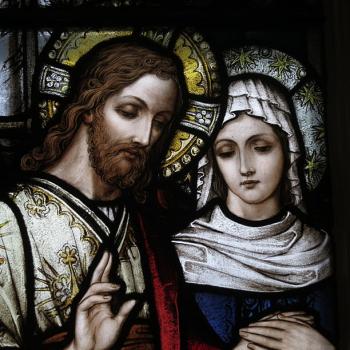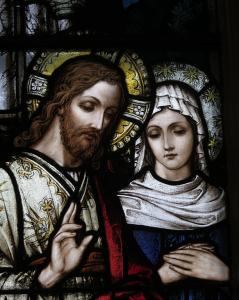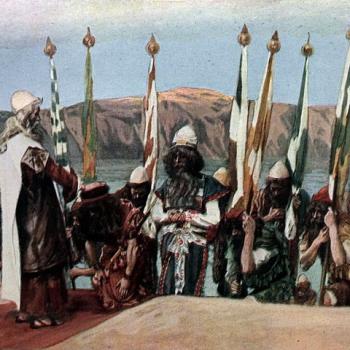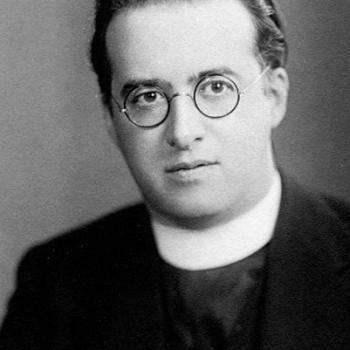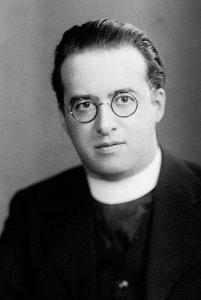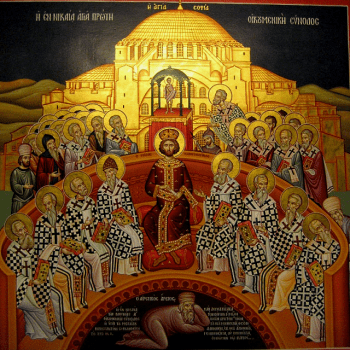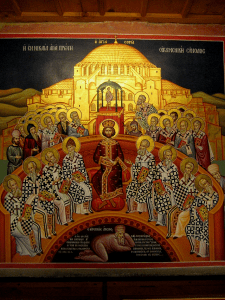
Lucas Banzoli is a very active Brazilian anti-Catholic polemicist, who holds to basically a Seventh-Day Adventist theology, whereby there is no such thing as a soul that consciously exists outside of a body, and no hell (soul sleep and annihilationism). This leads him to a Christology which is deficient and heterodox in terms of Christ’s human nature after His death. He has a Master’s degree in theology, a degree and postgraduate work in history, a license in letters, and is a history teacher, author of 25 books, as well as blogmaster (but now inactive) for six blogs. He’s active on YouTube.
***
The words of Lucas Banzoli will be in blue. I used Google Translate to transfer his Portugese text into English.
*****
This is a reply to Lucas’ heretical and blasphemous articles, “Maria é mãe de Deus (Theotókos)?” [Is Mary the mother of God?] (9-20-12) and “Deus tem mãe?” [Does God have a mother?] (5-12-13).
Let’s start with definitions and basic explanations, so readers will know with certainty exactly what the catholic claim is, and what UI am defending. Theotokos, the term in question, means literally, “God-bearer.” Mary is the mother of God the Son. If someone denies that Mary is the mother of God (the Son), then they deny that Jesus is God. If, on the other hand, someone denies that Mary is the mother of God (the Son), then they deny the virgin birth, and in effect, also the incarnation.
This resolves the problem altogether. But she is not only the mother of Jesus’ human nature (Christotokos) because motherhood is about giving birth to persons, not natures (or souls, as in our case, when mothers give birth).
Historic Catholics, Orthodox, and Protestants all believe that Jesus was God Incarnate: God in the flesh; the Second Person of the Holy Trinity. This title for Mary was specifically intended by the early Church to protect the deity or divinity of Jesus, since some were arguing that she was the mother of His human nature only. It would be odd to argue that human mothers give birth only to the bodies of their sons and daughters, rather than to a person who consists of body and soul. Human beings “co-create” in a sense the bodies of their children (implied by the word “procreate”), while they have nothing to do with their souls, which are directly created by God.
Likewise, Mary gave birth to Jesus as a human person, even though she had nothing to do with His divine nature (now merged with a human nature), which existed eternally. She gave birth to “the man Who was God,” so she is the mother of God (the Son). At no time have Catholics or Orthodox thought that Mary was “mother” of God the Father or the Holy Spirit. It’s impossible to find any official Catholic dogmatic document stating that Mary is the “mother of God the Father” or “mother of the Holy Spirit.” It is only from sheer misunderstanding that anything other than this was thought to be implied by “Mother of God.” Many notable Protestants have also used the title:
She became the Mother of God, in which work so many and such great good things are bestowed on her as pass man’s understanding. For on this there follows all honor, all blessedness, and her unique place in the whole of mankind, among which she has no equal, namely, that she had a child by the Father in heaven, and such a Child . . . Hence men have crowded all her glory into a single word, calling her the Mother of God . . . None can say of her nor announce to her greater things, even though he had as many tongues as the earth possesses flowers and blades of grass: the sky, stars; and the sea, grains of sand. It needs to be pondered in the heart what it means to be the Mother of God. (Martin Luther, Commentary on the Magnificat, 1521; in Luther’s Works, Pelikan et al, volume 21, 326)
On account of this personal union and communion of the natures, Mary, the most blessed virgin, did not conceive a mere, ordinary human being, but a human being who is truly the Son of the most high God, as the angel testifies. He demonstrated his divine majesty even in his mother’s womb in that he was born of a virgin without violating her virginity. Therefore she is truly the mother of God and yet remained a virgin. (Formula of Concord, from 1577: one of the Lutheran confessions, translated by Arthur C. Piepkorn: Solid Declaration, Article VIII: “The Person of Christ,” section 9)The description of Mary as the “Mother of God” was and is sensible, permissible and necessary as an auxiliary Christological proposition. (Karl Barth, Church Dogmatics, I, 2, Edinburgh: T. & T. Clark, 1963, 138) [see documentation of several other prominent early Protestants using the title “Mother of God”]
Scripture teaches that:
1) Jesus is God (many biblical proofs; Jn 1:1; Col 2:9).
2) Mary is His true mother (Is 7:14; Mt 1:16,18; 2:11, 13, 20; 12:46; Lk 1:31, 35, 43; Jn 1:15; 2:1; Gal 4:4).
Ergo, “Mary is the Mother of God” [the Son].
Another, less direct, but equally effective way of arguing the point is noting Elizabeth’s exclamation to the Blessed Virgin Mary: “And why is this granted me, that the mother of my Lord should come to me?” (Luke 1:43, RSV). The Greek word for “Lord” here (as usually in the New Testament) is Kurios. It’s widely applied both to God the Father and to Jesus, since they are both “Lord” and God” and equal as the Father and Son in the Holy Trinity. In fact, in a single passage (Rom 10:9-13), both the Father and the Son are called “Lord” (Kurios).
John Calvin, the most influential early Protestant leader after Martin Luther, wrote about Luke 1:43:
She [Elizabeth] calls Mary the mother of her Lord This denotes a unity of person in the two natures of Christ; as if she had said, that he who was begotten a mortal man in the womb of Mary is, at the same time, the eternal God. (Harmony of the Synoptic Gospels)
Martin Luther also made many affirming statements about Theotokos. Here are two of the most striking ones:
We, too, know very well that Christ did not derive his deity from Mary; but it does not follow that it must, therefore, be false to say, “God was born of Mary” and “God is Mary’s Son” and “Mary is God’s mother.”
Mary is the true, natural mother of the child called Jesus Christ, and the true mother and bearer of God . . . Mary suckled God, rocked God, made broth and soup for God. For God and man are one Person, one Christ, one Son, one Jesus, not two persons . . . just as your son is not two sons . . . even though he has two natures, body and soul, — body from you, soul from God alone. (On the Councils and the Church, 1539)
James Cardinal Gibbons: a great apologist in the early 1900s, brilliantly explained the doctrine of Theotokos:
We affirm that the Second Person of the Blessed Trinity, the Word of God, who in His divine nature is from all eternity begotten of the Father, consubstantial with Him, was in the fullness of time again begotten, by being born of the Virgin, thus taking to Himself, from her maternal womb, a human nature of the same substance with hers.
But it may be said the Blessed Virgin is not the Mother of the Divinity. She had not, and she could not have, any part in the generation of the Word of God, for that generation is eternal; her maternity is temporal. He is her Creator; she is His creature. Style her, if you will, the Mother of the man Jesus or even of the human nature of the Son of God, but not the Mother of God.
I shall answer this objection by putting a question. Did the mother who bore us have any part in the production of our soul? Was not this nobler part of our being the work of God alone? And yet who would for a moment dream of saying “the mother of my body,” and not “my mother?” . . . . .
In like manner, . . . the Blessed Virgin, under the overshadowing of the Holy Ghost, by communicating to the Second Person of the Adorable Trinity, as mothers do, a true human nature of the same substance with her own, is thereby really and truly His Mother.
. . . in this sense, and in no other, has the Church called her by that title. (The Faith of Our Fathers, New York: P. J. Kenedy & Sons, revised edition, 1917, 137-138)
Nestorius was not a “heretic”. On the contrary, he tried to restore the biblical principle that Mary is “Christotokos” (mother of Christ), while there were people who taught that she was “Theotokos” (mother of God). For him, the issue was not as simple as saying that (1) Jesus is God; (2) Mary is the mother of Jesus; then (3) Mary is the mother of God.
Then he rejected clear biblical teaching, and inexorable logic. Mary was the mother of Jesus, Who was the Second Person of the Holy Trinity and God the Son.
Proof of this is that, using similar syllogisms, we could conclude that Jesus “sinned” because (1) all men sin; (2) Jesus was a man; then (3) Jesus sinned. It is obvious that the Scriptures affirm that Jesus was without sin, but a syllogism similar to the one used by Catholics could show us otherwise.
This syllogism is a false one, because it has a false premise (“all men sin”). It is not of the essence of man that he must sin. Human beings were created good, and before they rebelled and fell, they were sinless. Therefore, “all men sin” is false, because Adam and Eve did not sin, pre-fall. The unfallen angels are also creatures (though not human beings) who never sinned. Babies who are murdered in abortion have not ever sinned, yet they are human beings. Mary never sinned, because she was filled with grace, by a special miracle of God.
Furthermore, they use other similar syllogisms to prove the other Marian dogmas as well. For example: (1) The pure cannot be born of the impure; (2) Jesus was pure; therefore (3) Mary is immaculate.
This is not correct Catholic theology. Any Catholic who uses this argument — though he may be perfectly sincere and pious — doesn’t know what he is talking about. I explain why the above argument is incorrect in my article, Was Mary’s Immaculate Conception Absolutely Necessary? [1-5-05; published at National Catholic Register on 12-8-17]. Catholics say that Mary’s Immaculate Conception was “fitting” (i.e., appropriate and to be expected) but not absolutely necessary. And we say that Jesus, being God for all eternity, can’t possibly sin (impeccability). This would be the case whether Mary was a sinner or not. Nor could He possibly receive original sin from Mary because He is not among creatures who rebelled against God and fell (since He is God).
If we read Job 14:4, we see that premise #1 is correct.
This is proverbial-type language at a very early stage of Judaeo-Christian theology. It can’t be used to determine fine points of very highly developed Christian theology.
However, this does not mean that conclusion (3) is right, since, by the same logic, Mary (pure) could not be born from someone impure either;
This is untrue. Mary’s immaculate state has nothing whatsoever to do with her mother, since it came from a special supernatural act of grace: she was filled with grace from the time of her conception. That has nothing to do with 1) Mary’s free will choice, or 2) her mother.
therefore, by the same syllogism we arrive at the conclusion that Mary’s mother is also immaculate.
If so, then this would be an example of being right for the wrong reasons.
But it doesn’t stop here. If Mary’s mother is immaculate and the pure cannot be born from the impure, then Mary’s grandmother is also immaculate. And so on: great-grandmother, great-great-grandmother… until Eva… all without blemish! It is evident, therefore, that those who arrive at the “conclusion” that Mary is the mother of God by the simple syllogism demonstrated above, incur the same fallacy presented in the other points.
No one other than Mary has to be immaculate in order for her to be,. It has nothing to do with her ancestors. It’s all about God and what He chose to do.
In addition, syllogisms similar to those used by Catholics can also be used to turn against themselves. For example: (1) Mary is not the mother of the Father; (2) The Father is God; therefore (3) Mary is not the mother of God.
That means that Mary is not the mother of God the Father, which is true. “Mother of God” only refers to being the mother of God the Son. There are distinctions even in the Trinity. The Father and the Holy Spirit do not become incarnate and take on flesh. They are immaterial spirits.
Also: (1) Mary did not beget the Holy Spirit; (2) The Holy Spirit is God; therefore (3) Mary is not the mother of God.
It’s the same error again, based on not understanding what Theotokos means in the first place. This is carnal reasoning, that Paul talks about with regard to the Corinthians and their pagan Greek philosophical background.
Interestingly, the syllogisms used by Marian fanatics are turned against themselves when we analyze them carefully.
Not at all. The one confused here is Lucas, not Catholics (and the Orthodox and Martin Luther and many Protestants who agree with us), as shown.
And that was exactly the question that Nestorius addressed: to say that Mary is or is not the mother of God is not as simple as that syllogism, but we must go into deeper terms if we want to reach a more certain conclusion. For, apparently, there is no problem with the Catholic syllogism; however, when we look more closely, we find like Nestorius that:
(1) One is only the mother of that which generates.
(2) Mary did not generate Christ’s divinity, but humanity.
(3) Therefore, Mary is the mother of Jesus as a man, and not of God.
In other words, Mary is the mother only of Christ’s humanity, and not of his divinity, which existed long before Mary. Therefore, the conclusion we come to is that Mary is the mother of Christ (Christotokos), and not the mother of God (Theotokos), as Catholics say.
This is just silly. As some of my citations above note, our mothers are not the mothers of our souls, which are directly created by God. But we don’t say that they are mothers only of our bodies. They are our mothers, and we are composed of both body and soul. Likewise, Mary is the mother of Jesus Christ the Person, Who has a Divine and Human Nature (neither of which Mary brought about through reproductive biological processes. What she did was participate in the ineffable joy of bearing the incarnate God: being a necessary and glorious part of the incarnation.
About Nestorius being accused of “heresy” by the Council of Ephesus (431 AD), we must, first of all, emphasize that infallibility does not come from the councils, but from the Bible.
That teaching is never in the Bible, while the Bible does teach that the first Christian council, at Jerusalem (Acts 15) was indeed infallible, since the decision was described as follows:
Acts 15:28-29 (RSV) For it has seemed good to the Holy Spirit and to us to lay upon you no greater burden than these necessary things: [29] that you abstain from what has been sacrificed to idols and from blood and from what is strangled and from unchastity. If you keep yourselves from these, you will do well. Farewell.”
1 Timothy 3:15 also teaches that “the church of the living God, the pillar and bulwark of the truth” (not just Scripture) is infallible
If councils were infallible and inerrant, then there would be no argument as to which councils are valid, for they would all be valid equally. Proof of this is that Roman Catholics accept 21 councils, while the Orthodox adopt only seven.
People disagree because not all men arrive at truth in equal measure. Look at the multiple hundreds of Protestant denominations to see that. But because a lot of falsehood is floating around, it doesn’t follow that there is not one truth (and one divinely protected Church). Nestorius is heretical based on what the Bible teaches, before we ever get to what an ecumenical council (correctly) said about him.
Tertullian was considered a “heretic” by the Church of the time, he was excommunicated, joined the Montanists and then created his own religious segment, and Catholics and Evangelicals still cite abundantly the writings of the great theologian Tertullian in all his teachings.
This is nonsense through and through. Wikipedia (“Tertullian”) noted: “today most scholars reject the assertion that Tertullian left the mainstream church or was excommunicated” [citing source: Tertullian and Paul, by Todd D. Still & David E. Wilhite, A & C Black, 2012]. Co-author Wilhite observed:
The past half-century of scholarly investigation into the life of Tertullian has formed an overwhelming consensus that Tertullian was not a Montanist schismatic. (p. 46)
Wilhite noted (p. 47) that St. Jerome (De virg. vel. 53) was the first to claim that Tertullian had formally left the Catholic Church and committed schism. He was born (c. 343) about 113 years after Tertullian died (c. 225), so that obviously didn’t occur during Tertullian’s own lifetime, and they believe that there was “a complete lack of evidence that Tertullian was a schismatic” (p. 47). Wilhite asserts:
Tertullian remained, and repeatedly referred to himself as, within the church. (p. 48)
I have contended that dismissing Tertullian’s views as “Montanist” is premature . . . (p. 49)
So (I’m extremely curious) what scholarly source does Lucas draw from, where he learned that Tertullian was 1) called a “heretic” by the Church in his lifetime, and 2) was excommunicated?
Therefore, condemning Nestorius as a heretic for the simple fact that part of the Church of the time and a council considered him to be so, is at least an act of immaturity, committed by novice and amateur “apologists”, who think that the Church in the 5th century (Nestorius’ time) preached all the harmonic doctrines as found in the Scriptures!
Yes, we believe in ecumenical councils, which are infallible in some of their proclamations, following the scriptural model of the council of Jerusalem. Nestorius was formally and rightly declared to be a heretic by the ecumenical Council of Ephesus in 431.
Furthermore, the fact that the Church did not have an “official” position on this is evident, and that opinions were divided, which we can evidence in the Council of Ephesus itself. Bishop Celestine of Rome joined the side of Cyril, who took charge of the Council, opening the discussions without waiting for the arrival of the long-delayed entourage of Eastern bishops from Antioch, who were in favor of Nestorius. Therefore, they condemned Nestorius without giving the defense due opportunity and to hear both sides.
However, as the Council progressed, John I of Antioch and the eastern bishops arrived and were furious to learn that Nestorius had already been condemned. They gathered in a synod of their own and deposed Cyril. Both sides appealed to the Emperor and he initially ordered both of them exiled. However, Cyril eventually returned after bribing several members of the imperial court! This story is not told by them, for they only tell half of the story, hiding fundamental truths that belie their ploy.
Lucas obviously wants to emphasize the disagreements, but in his selectivity, neglects to point out that ultimately John I of Antioch and Cyril were reconciled (against Nestorius). The Protestant McClintock and Strong Biblical Cyclopedia (1880: “Nestorius”) stated:
Nestorius saw himself deserted by many of the bishops of his party; and though John of Antioch and a number of the Eastern bishops stood firm for a time, John and Cyril were ultimately brought to an agreement, and both retained their sees.
So yes, there was significant agreement, which is why both Catholics and Orthodox agree that Nestorianism was heretical and that Theotokos is a good and proper title. Nestorianism barely exists today in a formal sense. Encyclopaedia Britannica (“Nestorianism”) noted:
The modern Nestorian church is not Nestorian in the strict sense, though it venerates Nestorius and refuses to accept the title Theotokos for the Blessed Virgin.
The article continues:
In 1551 a number of Nestorians reunited with Rome and were called Chaldeans, the original Nestorians having been termed Assyrians. The Nestorian Church in India, part of the group known as the Christians of St. Thomas, allied itself with Rome (1599) and then split, half of its membership transferring allegiance to the Syrian Jacobite (monophysite) patriarch of Antioch (1653).
On the second issue, Luke 1:43 says absolutely nothing about Mary being “the mother of God”. To affirm this is to go beyond what is written (1 Cor.4:6). The biblical text only says “mother of my Lord”, not mother of God. In Greek, the word used for “Lord” is “Kyrios” (kuriou). This term, applied to Jesus in Luke 1:43, is not used to refer to God alone. Let’s look at some references to “Lord” (kuriou) in the New Testament without being specifically to Jehovah:
1st Owners of property are called Lord (Mt. 20:8, kurios is “owner” – NIV).
2nd The owners of houses were called Lord (Mk. 13:35, owner = kurios).
3rd The owners of slaves were called Lord (Mt. 10:24, lord = kurios).
4th The husbands were called Lord (1 Pet. 3:6, lord = kurios).
5th A son called his father Lord (Mt. 21:30, lord = kurios).
6th The Roman Emperor was called Lord (Acts 25:26, His Majesty = kurios).
7th The Roman authorities were called Lord (Mt. 27:63, lord = kurios).
So if anyone claims that Luke 1:43 is some “proof” that Mary is “the mother of God,” he is at the very least a gross immaturity and a blatant lack of biblical knowledge.
Kurios can indeed be used in a wider, “non-God” sense. But we know that both God the Father (Mt 11:25; 21:42; Mk 13:20; Lk 4:18; 1 Tim 6:15) and Jesus (Lk 2:11; Acts 7:59; 10:36; 1 Cor 12:3; Phil 2:10-11; Heb 1:10; Rev 17:14; 19:16) are called Kurios in the sense of LORD (= God). The Father and the Son are both called “Lord” in one passage (Mt 22:41-45; Rom 10:9-13). God the Father is called “Lord” (Kurios) and “God” (Theos) in one passage many times (Mt 22:37-38; Mk 12:29-30; Lk 1:32, 46-47, 68; 20:37; Acts 3:22; Rev 18:18). Likewise, Jesus is called “Lord” (Kurios) and “God” (Theos) in one passage (Jn 20:28-29; also true of Hebrews 1:8 and 1:10, if seen as one passage in the larger context; and God the Father uses both words for Jesus). See all of these passage and more fully written out in my paper, “Deity of Jesus: Called “Lord” (“Kurios”) and “God” (“Theos”)”.
“Mother of God” doesn’t rest scripturally only on Luke 1:43 anyway. It can easily be shown through straightforward deduction:
1) Mary is the mother of Jesus (Mt 1:18; 2:11, 13-14, 20-21; 12:46; 13:55; Mk 3:31-32; Lk 1:43; 2:33-34, 48, 51; 8:19-20; Jn 2:1, 3, 5, 12; 6:42; 19:25-26; Acts 1:14).
2) Jesus is “God” / Theos:
Matthew 1:23 “Behold, a virgin shall conceive and bear a son, and his name shall be called Emmanuel” (which means, God with us).
John 1:1, 14 In the beginning was the Word, and the Word was with God, and the Word was God.. . . And the Word became flesh and dwelt among us . . .
John 20:28-29 Thomas answered him, “My Lord and my God!” [29] Jesus said to him, “Have you believed because you have seen me? Blessed are those who have not seen and yet believe.”
Titus 2:13 awaiting our blessed hope, the appearing of the glory of our great God and Savior Jesus Christ,
Hebrews 1:8 But of the Son he says, “Thy throne, O God, is for ever and ever, the righteous scepter is the scepter of thy kingdom. [God the Father calls God the Son, “God”; The larger passage cites Ps 102:25-27, which is applied to God]
2 Peter 1:1 . . . in the righteousness of our God and Savior Jesus Christ:
1 John 5:20 And we know that the Son of God has come and has given us understanding, to know him who is true; and we are in him who is true, in his Son Jesus Christ. This is the true God and eternal life.
3) Therefore, Mary is the Mother of God [the Son: Jesus].
And finally, on the third question, there is no historical evidence (I repeat: no evidence!) that goes back to the apostles and that tells us explicitly that Mary was the mother of God.
I just provided biblical proof, which is from the apostles. There is quite a bit of corroborating evidence from Church fathers prior to 431 as well.
The first and largest historical source that refers to the apostles that we have today is the New Testament, which makes 39 mentions of Mary as being “mother of Jesus” (Christotokos), but absolutely none of her being “mother of God” (Theotókos).
It’s an inexorable deduction, as shown.
The first who preached Theotókos was Irenaeus of Lyon, at the end of the 2nd century AD. Opinion in the Church was not uniform in this regard, and we have no apostolic or 1st to early 2nd century AD evidence to show that Christians at the time believed in Theotokos.
It’s in the Bible itself, as shown, and that is apostolic, first-century, and inspired, infallible revelation.
I always ask Catholics: “Did God die on the cross”?
Yes He did, because Jesus was God. God the Son died on the cross. God the Son alone became man. God the Son alone atoned for the sins of mankind by His sacrificial death on the cross.
The answers are always divided, most of the time dubious and contradictory, and not infrequently confusing.
That’s because there are apologists with differing degrees of knowledge answering.
The truth is that they themselves resist saying that God died on the cross, because to say that God dies is the height of blasphemy, nor does the devil believe in such a thing.
The Bible says both that Jesus died on the cross and was raised “from the dead” (Mt 17:9; 27:50; 28:7; Mk 9:9-10; 15:37; Lk 23:46; 24:46; Jn 2:22; 19:30; 20:9; 21:14; Acts 3:15; 4:10; 10:41; 13:30, 34; Rom 5:6, 8; 6:8-10; 8:34; Rom 14:9, 15; 1 Cor 8:11; 15:3; 2 Cor 5:15; Gal 2:21; 1 Thess 4:14; 5:10; 1 Pet 3:18; Rev 1:18; 2:8; see many more) and that He was God / Theos (see seven Bible passages not far above). So now the Bible is blasphemous?
But if God does not die,
God the Father and God the Holy Spirit don’t die, because they don’t have bodies. God the Son dies.
that means that Jesus died on the cross as a man.
He died as the incarnate God-man. This is all carnal thinking. Lucas just doesn’t get it. And that’s sad. Most historic Protestants have understood this.
And if the Jesus who walked here on earth was a man like all of us, then Mary is the mother of the human Jesus, not of God.
No; she is His mother, period, and He is God and man both. Mothers give birth to people, not natures or souls.
Did God die on the cross?
Yes, God the Son did.
Can God have a mother?
God the Son can, yes. And that’s what Theotokos refers to. Only the willfully ignorant or consciously heretical person could fail to see that.
The answer to both questions is a resounding “No”!
The answer to both questions is a resounding “Yes”!
In this way, we see that the Catholic claims to support the Marian dogma that Mary is the mother of God are nothing more than deception, with only an “appearance of wisdom” (Col.2:23), but that, when analyzed more closely, we see that they are “ingeniously invented fables” (2Pe.1:16).
Then I eagerly await Lucas’ answers to this article. The real “fun” and challenge in theological debates comes in the second round and after, where people are subject to cross-examination and counter-reply. I’m here, waiting, and will defend all that I wrote, or retract if shown to be wrong.
Now onto Lucas’ second article on the topic: “Deus tem mãe?” [Does God have a mother?] (5-12-13).
Today, May 12, 2013, is Mother’s Day, and, as it could not be otherwise, an old discussion comes to the fore again: does God, the Eternal Creator and First Cause of everything, also have a mother?
No; God the Father obviously does not. No one with an IQ higher than a slug ever said otherwise.
Without wanting to delve too deeply into the subject, which I have also addressed here, here and here, I have elaborated the following ten points that clearly indicate that no, God does not have a mother:
1st Because, in the first place, to be considered a “mother of God” we must take into account the trinitarian concept of God. God is not limited to just the Father, just the Son or just the Holy Spirit, but the Father, Son and Holy Spirit is the one true God. Therefore, for Mary to be considered as “mother of God” she would also have to be mother of the Father and the Holy Spirit.
That’s not true at all. Each Person of the Holy Trinity is fully God, but there are a few differences between them (only the Son is incarnate and takes on flesh; the Spirit proceeds from the son: filioque). What is said of any of them is said of God. Again, Lucas is thinking in carnal terms, not spiritual, biblical terms. Theology and spirituality do not reduce merely to Greek logic. It’s not philosophy. It’s a religious faith. And biblical / Hebraic “both/and” thought is very different from Greek, secular “either/or” (and too often, Protestant) thinking. Lucas here and throughout these two papers reasons like an atheist, not a believing trinitarian Christian.
Otherwise, we could use exactly the same syllogism used by Catholics against themselves:
a) Mary is not the mother of the Father;
b) The Father is God;
c) Therefore, Mary is not the mother of God.
a) Mary is not the mother of the Holy Spirit;
b) The Holy Spirit is God;
c) Therefore, Mary is not the mother of God.
Once again, I reiterate that Theotokos, the word in question, means “God-bearer.” Only one Person of the Triune Godhead (God the Son) was born of and from a human mother. Mary can’t give birth to eternal spirits. If we had been present at Jesus’ birth, and got to hold baby Jesus, we would say, “this is Jesus: the Person that Mary gave birth to, and is the mother of, Who is Lord, Messiah [Christ] and Immanuel [“God with us”]”. No one in their right mind would say, “this is the human nature that Mary gave birth to.” Even saying or writing it sounds utterly ridiculous. But this is what the hyper-rationalistic Nestorianism entails.
Lucas again reasons like an atheist here, not a Christian. I would have opposed him just as vigorously on this point when I was an evangelical Protestant, because these things are plain in Scripture (i.e., to one who thinks spiritually, not carnally) and because one of my first great apologetics projects in the early 1980s was compiling the biblical evidences for the divinity / deity of Christ and the Holy Trinity.
2nd Furthermore, even in the case of Jesus Christ, we must consider that Mary was his mother during the 33 years he was here on earth, and not in eternity.
She will remain His mother then, just as my own mother or my wife’s mother will remain so for eternity, and I will remain my children’s father and my grandchildrens’ grandfather.
Mary cannot be considered as the mother of Jesus as he already existed from eternity
She became His mother when He came down from heaven and took on flesh (incarnation) and human nature in addition to His Divine Nature that He had always possessed.
and she was not even born yet, nor in the condition of Creator/creature. In order to claim that Mary remains the mother of Christ, it would be necessary to prove, first of all, that Jesus maintained the same earthly nature even after having already entered the heavens, so that Mary is biologically the mother of God.
It’s implied that He will still have His body (then glorified and able to go through walls) and wounds, because He did in His post-Resurrection appearances. It’s also implied in what St. John saw in heaven, after Jesus’ death, resurrection, and ascension:
Revelation 5:6 And between the throne and the four living creatures and among the elders, I saw a Lamb standing, as though it had been slain, . . .
And one passage states it outright:
Philippians 3:21 who will change our lowly body to be like his glorious body . . .
It happens, however, that God is spirit (Jn.4:24),
God the Father and God the Holy Spirit are spirits. Jesus is not, since His incarnation. The meaning of resurrection is a renewed, reborn physical body. This is true of Jesus, and it is true of us, who will be “like him” after we die. Denying this is blasphemous heresy.
and a spirit does not have flesh and bones (Lk.24:39).
That’s right. Jesus does have flesh and bones after His resurrection. He ate fish. He was embraced. Thomas put his hand in His wounds.
Jesus, in His heavenly condition, is no longer in the flesh (Heb.5:7),
Nonsense. “In the days of his flesh” in Hebrews 5:7 simply means “His earthly life.”
and therefore does not have human genetics, which is why Mary is no longer biologically linked to Him.
He has the same human genetics that He had from the day of His birth. He has DNA received from Mary.
3rd Furthermore, to say that God has a mother because Mary was the mother of Jesus on earth implies other even greater absurdities, such as, for example, that God has a father or stepfather who is Joseph, brothers (or “cousins”, as the Catholics prefer) and other relatives.
Paul referred to “brothers [literally, cousins] of the Lord” (1 Cor 9:5). And “Lord” (Kurios) is continuing the usage of “LORD” in the Old Testament which stood for “YHWH”: the name of God that God revealed to Moses at the burning bush.
And along the same lines, Mary’s mother is God’s grandmother, Mary’s grandmother is God’s great-grandmother, Mary’s great-grandmother is God’s great-grandmother, and so on in an endless succession until we get to Eve. So Eve would be related to God to a very distant degree! What is more rational: to think that God has a mother, has a brother in the flesh, has a father, has cousins, has a grandmother, great-grandmother and great-grandmother (and all this in a biological and genetic sense), or to believe that all these mentioned are just creatures of God, making the correct distinction already quoted between the heavenly and the earthly?
Only one person bore God: Mary. Every other “relation” is in a limited sense only. None of them were conceived by the Holy Spirit as Jesus was.
4th Taking into account that one is only the mother of what she generates, we must ask: did Mary generate the divinity of Christ? No!
Of course Mary didn’t “generate” Jesus’ Divine Nature, which is eternal. We fully agree. Our mothers didn’t generate our souls, either, which were direct creations of God at the time of our conceptions. But they are still “our mothers” not merely the mothers of our bodies: which no one ever says, because it’s silly and stupid. Analogously, Mary is Jesus’ mother, because He is one Man, with a Divine Nature and a Human Nature. He can’t be divided. Mothers also didn’t generate the fathers’ DNA that every child receives.
Mary generated only the human nature of Jesus, while he was “in the days of his flesh” (Heb.5:7).
That’s not at issue, so it’s a non sequitur in this discussion. But she helped generate His physical body, too. Jesus probably looked like Mary.
The divine nature of Christ has always existed, it is eternal, it comes from long before Mary even existed.
Indeed.
Claiming that Mary is the mother of God implies falling into two absurdities: that of claiming that she can be the mother of something that was not generated by her, or that Mary did generate the divinity of Christ.
It implies no such thing, correctly understood, and as explained above. Lucas simply doesn’t understand it, and he won’t until he stops thinking carnally and approaches it biblically and spiritually.
In the first case, Mary would be the mother only of the humanity of Jesus, not of the divinity (and, therefore, the mother of the man Jesus, not of the divinity of Christ), while in the second case Mary would have to be previous to the divine nature of Christ to have generated her, which is impossible, since Jesus is Creator and Mary is a creature.
Those are not the only two choices, as shown. She is the mother of a Person, the God-Man Jesus, Who has two natures.
5th Placing Mary on the level of “mother of God” (Theotokos)
She bore God the Son. Or does Luca dispute that, too?
is an abominable heresy that even amounts to blasphemy, on the same level as pagan peoples who always had a “mother-goddess” who was considered the “mother of God” for these people.
They are not using the term in the same sense and meaning that we hold.
Catholics reject the title of “mother goddess”, but accept that of “mother of God”,
That’s because Mary isn’t a goddess, as if she were a female member of the trinity or a “Quaternity.” She’s the Mother of God the Son.
in an attempt to camouflage their clear connection with pagan peoples, such as Isis, worshiped in Egypt as the “mother of God”.
Again, that is vastly different from what we believe. It’s a dumb, clueless comparison.
Interestingly, she also held the title of “Queen of Heaven” (Jer.7:18; 44:17-25), exactly the same title Catholics today ascribe to Mary, in addition to “Our Lady”. This clear syncretism with paganism shows that considering Mary as the mother of God is not merely an affirmation of the divinity of Christ, as Catholics claim, but the defense of a pagan religious syncretism in which Mary is worshiped with the same titles and attributions that the pagans offered to their mother goddess, the Queen of Heaven.
That’s a lie and Lucas can’t prove any sort of equation with paganism, which is why he doesn’t attempt it. He just repeats the same tired old anti-Catholic whoppers that (sadly) millions of theologically undereducated, gullible people have swallowed without thinking for 500 years now.
6th Although this question is delicate and may scandalize many, we should ask: Does God have a penis? Of course not.
Of course God the Father doesn’t, being a spirit.
But Jesus’ human nature had.
Natures don’t have a penis. Men do.
Failing to clearly differentiate as two distinct extremes the human nature of Christ on earth from the divine nature of Christ in Heaven would lead us to innumerable absurdities, going far beyond the aforementioned.
I haven’t seen any yet in Catholic, Orthodox, and mainstream Protestant thinking. But I’ve seen numerous ones in Lucas’ carnal thinking and the ridiculous conclusions he comes up with. It’s sad to observe.
If Mary is the mother of God because she was the mother of Jesus for 33 years while he was in the flesh here on earth, then God has all the physical characteristics of the Christ-man.
God the Son, Jesus does; only glorified now.
But if these characteristics are no longer part of Him, as God, then how can Mary be considered the mother of God?
Lucas wrongly assumes that He doesn’t have a body because he has adopted the heresy of denying that Jesus maintains His resurrected, glorious body forever. I would venture to guess that 95% of Protestants disagree with Him that Jesus is now supposedly a spirit again, rather than a gloriously resurrected body resembling what He looked like during His 33 years on earth. It’s blasphemous and heretical and has no biblical basis.
7th If Mary is the mother of God because she was the mother of Jesus on earth, then we should conclude that God died on the cross. Now, this is absurd, since the Bible teaches that God is immortal, He cannot die under any circumstances (1 Tim.6:16). So, if God is immortal and cannot die, it logically follows that God did not die on the cross. And, if God did not die on the cross, Mary cannot be called the mother of God, since she had been the mother of exactly that Jesus who was nailed and killed on a cross.
We’ve already been through all this. It’s just repeating carnal nonsense.
8th Another similar question is: Was God born after nine months?
Jesus, God the Son was born (as my patience quickly reaches it’s limits . . .).
If so, this would lead us to believe that God had a beginning, which totally goes against the universal theological belief that God is the First Cause, is the Eternal, the one who had no beginning and will have no end of days (Heb.7 :3). Therefore, God did not have a beginning, He was not born from the womb of Mary. And if God was not born after nine months, that means Mary can be considered the mother of the Son of God, or the mother of “the man Jesus Christ” (1 Tim.2:5), but not the mother of God if God was not born. in her belly. Mother of God is a wrong terminology, which may well be replaced by several others that may properly apply.
This is too silly and ridiculous to be worthy of any response. But I’ve already essentially addressed it above. Two more to go . . .
9th We must also remember that Jesus emptied himself when he became man, as Paul says: “but he emptied himself, becoming a servant” (Phil.2:7). He “did not count it as usurpation to be equal with God” (v.6).
He was humble. He never ceased to be God.
In the preserved record of the apostle Thaddeus, who lived with Christ, we confirm the interpretation that this emptying involved deposing his own divinity. This was recorded by Eusebius of Caesarea, . . .
This is the ahistorical material in Eusebius referred to as the Abgar Legend. The Wikipedia article on this summarizes:
The letters, while taken seriously in many Christian traditions for centuries, are generally classed as pseudepigrapha by modern Christians and scholars. . . . The letters were likely composed in the early 4th century. . . .
[T]he origins of the story are far still from certain, although the stories as recorded seem to have been shaped by the controversies of the third century CE, especially as a response to Bardaisan.
This is not a serious argument, and I refuse to give it any attention beyond what I just gave it: to expose it’s true nature.
Mary was the mother of Jesus while he was emptied of his attributes of divinity, and not as God.
Sheer nonsense. This blasphemous falsehood is based on the spurious documentation of the Abgar Legend, not Holy Scripture or legitimate sacred tradition.
This explains why He did not know the day of His own return (Mk.13:32), for He had already emptied Himself of the attribute of omniscience,
Nonsense again. Jesus was always omniscient in His Divine Nature. My friend David Palm did a master’s thesis on this question: “The Signs of His Coming”: for Trinity Evangelical Divinity School, Deerfield, Illinois (1993). He wrote it as an evangelical Protestant, later became a Catholic, and recently noted that he would change nothing in it. I summarized his arguments in this paper:
Seidensticker Folly #58: Jesus Erred on Time of 2nd Coming? (with David Palm) [10-7-20]
See also:
“The Last Days”: Meaning in Hebrew, Biblical Thought [12-5-08]
Dr. David Madison vs. Jesus #3: Nature & Time of 2nd Coming [8-3-19]
and why He could not (rather than “will not”) perform miracles on one occasion because of the people’s unbelief (Mk.6:5), for he had already emptied himself of the attribute of omnipotence.
That’s a blasphemous and heretical lie as well. It was because of the unbelief, as the text actually says. It wasn’t because He was no longer omnipotent, which the relevant text does not say. Jesus remained omnipotent as an incarnate man:
John 2:19-21 Jesus answered them, “Destroy this temple, and in three days I will raise it up.” [20] The Jews then said, “It has taken forty-six years to build this temple, and will you raise it up in three days?” [21] But he spoke of the temple of his body.
John 5:21 For as the Father raises the dead and gives them life, so also the Son gives life to whom he will. [implied: the Father’s unique characteristics are also possessed by the Son; cf. 3:35; 5:19-20; 6:40; 13:3]
John 10:17-18 “For this reason the Father loves me, because I lay down my life, that I may take it again. [18] No one takes it from me, but I lay it down of my own accord. I have power to lay it down, and I have power to take it again; this charge I have received from my Father.”
Philippians 3:21 who will change our lowly body to be like his glorious body, by the power which enables him even to subject all things to himself. (cf. Rev 1:18; 3:7)
Colossians 1:17 …in him all things hold together.
Hebrews 1:3 …upholding the universe by his word of power.…
Only by being fully human could Jesus be truly tempted in the wilderness (Mt.4:1), for James tells us that “God cannot be tempted” (Jas.1:13).
This is a misunderstanding, too. Jesus did not have concupiscence: the propensity to sin. The devil could attempt to tempt him, but it was doomed to failure as an impossibility. See:
Nestorian Heresy and the Tempting of Jesus [4-19-05]
Jesus & God the Father: Sinful Due to Being Tempted? [3-29-18]
It is precisely because he was fully human like us that today we can mirror the example of Christ who conquered the evil one as a man, so that, in the same position as humans and not that of a God-man, we can also conquer in the same way as He overcame (Heb.4:14-16). That’s why we can say that He was like us “in every respect” (Heb.2:17).
He is like us in many ways, but not all ways. We can always sin. Jesus could not, being impeccable. Nor could He be tempted.
10. Finally, we must emphasize that the belief that Mary was the mother of God is not found in the Bible, because nowhere is Mary reported as being “mother of God”, this title is completely omitted in relation to her.
Lots of terms we use are not in the Bible. The important thing is whether the concept is present. I showed that it is.
Instead, we see dozens of quotes in which Mary is reported to be the mother of Jesus, versus zero saying she was the mother of God.
It doesn’t have to say “Mother of God.” It need only say that 1) she is His mother, and 2) He is God, which it certainly does. God gave us the brains to put two and two together and come up with four.
This reveals that, at the very least, the apostles and evangelists were much more careful in this matter than today’s Catholics, who blatantly say throughout the four corners of the earth that Mary is the mother of God, something in which all biblical writers they were careful enough never to say that.
They expressed the concept. They simply didn’t use the particular term. But Revelation 12 is a pretty striking presentation of a glorified Mary in heaven.
So we can say, without fear of being wrong, that no, God does not have a mother.
Again, the Father and Holy Spirit do not; the Son does.
***
Practical Matters: Perhaps some of my 4,000+ free online articles (the most comprehensive “one-stop” Catholic apologetics site) or fifty books have helped you (by God’s grace) to decide to become Catholic or to return to the Church, or better understand some doctrines and why we believe them.
Or you may believe my work is worthy to support for the purpose of apologetics and evangelism in general. If so, please seriously consider a much-needed financial contribution. I’m always in need of more funds: especially monthly support. “The laborer is worthy of his wages” (1 Tim 5:18, NKJV). 1 December 2021 was my 20th anniversary as a full-time Catholic apologist, and February 2022 marked the 25th anniversary of my blog.
PayPal donations are the easiest: just send to my email address: [email protected]. You’ll see the term “Catholic Used Book Service”, which is my old side-business. To learn about the different methods of contributing, including 100% tax deduction, etc., see my page: About Catholic Apologist Dave Armstrong / Donation Information. Thanks a million from the bottom of my heart!
***
Photo credit: The Virgin of the Angels (1881), by William-Adolphe Bouguereau (1825-1905) [public domain / Wikimedia Commons]
***
Summary: Brazilian Protestant apologist Lucas Banzoli goes after the Catholic belief in Mary as the Mother of God (Theotokos). I refute his many serious and heretical errors.






